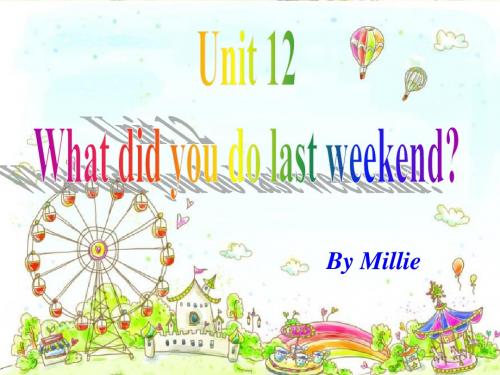瑞丁英语初中语法chapter 12 虚拟语气(教师版)
- 格式:pdf
- 大小:382.68 KB
- 文档页数:5


人教版初中英语七年级下册Unit12SectionB教材全解Unit 12 What did you do last weekend?Unit 12 Section B教材全解1.flew a kite放风筝【重点注释】flew为fly的过去式,fly此处作及物动词,意为“放飞(风筝、飞机模型等)”,fly a kite=fly kites放风筝。
例如:Can you fly a kite?你能放风筝吗?We flew kites in the park last Sunday.上个星期天我们在公园里放风筝了。
My father helped me to fly the model plane.我的父亲帮助我放飞飞机模型。
【拓展记忆】fly还可作不及物动词:1)意为“飞,飞行”,fly to sw.=go to sw.by plane/air=take a plane to sw.乘飞机去某地。
例如:I wanted to fly like a bird.我想象鸟一样飞。
We flew to Beijing yesterday.昨天我们乘飞机去的北京。
He flew back to London.他飞回了伦敦。
Mr. Li flew to Shanghai.=Mr.Li went to Shanghai by plane/air.=Mr.Li took a plane to Shanghai.李先生乘飞机去上海了。
2)意为“飞逝”。
例如:How times flies!时间过得真快呀!2.swam in a swimming pool 在游泳池里游泳【重点注释】swam为动词swim的过去式;swimming是动词swim的动名词形式,在此用作定语,表示用途或功能,即a swimming pool=a pool for swimming。
类似的表达还有:a sitting room起居室,a reading room阅览室,a waiting room 候车室。




七年级下册英语第十二单元语法解析Unit 12 What did you do last weekend?语法解析1.play badminton 打羽毛球play +运动play soccer play tennis play sportsplay the + 乐器play the guitarplay with…和某人\物玩耍2.I worked as a guide at the Natural History Museum.我在自然历史博物馆当导游。
work as:担当,从事He works as a cleaner in a hospital.3.How interesting!此句是感叹句。
由how 引导的感叹句,其句子结构也分为三种:How +形容词/ 副词+主语+谓语!”。
如:How careful she is! 她多么细心啊!How fast he runs! 他跑得多快啊!How +形容词+a/an +可数名词单数+主语+谓语!”。
如:How beautiful a girl she is! 她是个多么漂亮的姑娘啊!How +主语+谓语!”。
如:How time flies! 光阴似箭由what 引导的感叹句,其句子结构可分为:What + a/an +形容词+可数名词单数+主语+谓语!”。
如:What a nice present it is! 它是一件多么好的礼物啊What +形容词+可数名词复数/不可数名词+主语+谓语What beautiful flowers they are! 多么漂亮的花啊!What fine weather it is today! 今天天气多好啊!!1一般过去时的特殊疑问句含有实意动词特殊疑问句结构为:疑问词+did+主语+动词原形+其它?20)---What did you do last night?---I did my homework.21)---Where did you go last week?---I went to Shanghai with my parents.That’s all for today!Thank you!含有be动词的特殊疑问句结构为:疑问词+was / were+主语+其它?如:11)---Where were you last night?12)---We were at my uncle’s house.13)---How was your weekend? ---It was great.2.A family of mice were in the kitchen on Saturday morning. on +某日+mornig/afternoon/evening.in + morning\afternoon\evening3.It’s important to learn a second language.It 是形式主语,真正的主语是to learn a second language .It 作形式主语的常见句型:1. 代作主语的动词不定式,其句型为(1)It be adj. (for sb.) to do sth.(2)It be adj. of sb. to do sth.(3)It替代作主语的动名词的常见句型:It’s no good/use doing…It’s (well)worth doing…It’s (well)worth one’s while doing/to do1.But I was so tired that I went to sleep early.但是,我是如此的累,以至于很早就去睡觉了。
Unit 12 What did you do last weekend?Section A grammar focus to 3c讲义一、Teaching aims:1.recognize the grammar in a different context2.practice using the grammar in exercises3.practice speaking with the target language二、teaching procedures:1 全班朗读grammar focus总结语法规律2.学生小组完成3a 3b 核对答案3 小组完成3c 请同学表演三、英汉互译1.参观。
2.grandma3.划船.4.农场.5.Play badminton 。
6.同班同学7. weather 。
8.沙滩.9.失去。
四、小组合作一般过去时的用法动词一般过去时,表示过去发生事。
句中谓语用过去式,,过去时间作标记。
疑问句构成有方法,主语前面did加。
否定句,也简单,主语后面didn't 添。
还有一点勿忘记,后面动词要还原。
五、练习题1. -When_you_here?-Two days ago.A. did; comeB. have; comeC. will; comeD. do; come2. -What__the noise, Bill?-Sorry, I broke my glass.B. wasC. has beenD. will be3. Sue wasn't happy because she_the concert given by her favorite singer.A. missesB. missedC. will missD. is missing4. -Look at my new smart phone.-Wow, it's so cool! When and where___ you it?A. do; buyB. have; boughtC. did; buyD. have; had5. The debate on whether to keep pets forty minutes yesterday afternoon.A. lastB. lastedC. will lastD. has lasted六、词义辨析法完形填空题解答技巧在解答完形填空题目时,有时会遇到这样的情况,所给的选项均为名词、形容词、副词或动词(短语)。
Unit 12祈使句;校规;标志语;动词短语;• school rules• break the rules / obey the rules• wear hats = wear a hat•Don’t arrive late f or class.•Don’t run in the hallways.•Don’t eat in the classroom s.•Don’t listen to music in the classrooms or the hallwa ys. •Don’t fi ght with others.•Don’t go out on s chool nights.• Do your homework after school.• What are the rules at your school?•Can we do…?Yes, we can. / No, we can’t.Can you wear hats in school?Do you have to wear a uniform at school? What else do you have to do?after class / schoolin classin the classroom• have to wear sports shoes for gym class • have to clean the classroom every day • have to wear a uniform• practice the / your guitar• a s et of rules• make your own rules• I c an’t go out.I can’t, either.• every weekend• I have too many rules in my house. • too many rules• too much food / much too dear• every morning• meet my friends after school• on school nights•have to be in bed by ten o’clock• on weekends• wash my clothes / clean my room• help my mom make dinner• later•go to the Children’s Palace to learn the piano •I never have any fun.• have to be in bed• have to go to bedNo + 动词ing /名词.(不准做…)•No smoking! = Don’t smoke.•No talking! = Don’t talk. = Keep quiet.• No food or drinks.= Don’t take any food or drinks here.•No wet umbrellas.• No listening to music.• No schoolbags.• sports shoes / sports news / sports meeting / sports club • family rules•Don’t talk loudly at home.•walk to …•ride a bike to …•drive (a car) to …• take a b us/train/plane to…• go to the park on foot• go to school by bus / car / train / bike /plane•That’s right.• too strict• They are very healthy.• went to Shanghai with my family• went on a three-day school trip。
Chapter12.虚拟语气Subjunctive MoodI本章要点1.虚拟语气的含义2.if句式中的虚拟语气(现在、过去、将来)3.虚拟语气的省略和倒装4.名词性虚拟语气(表示建议,命令,惊叹时的名词性从句)5.虚拟语气的其他用法(常考的相当于if的虚拟)II虚拟语气语法点分述一、虚拟语气虚拟语气(Subjunctive Mood)用来表示说话人的愿望、请求、意图、建议、怀疑、设想等未能或不可能成为事实的情况,以及在说话人看来实现可能性很小的情况。
由于虚拟语气是动词的一种特殊的表现形式,因此动词的变化形式体现出虚拟语气所包含的不同含义。
Jane:Do you think,because I am poor,obscure,plain,and little,I am soulless and heartless? You think wrong!I have as much soul as you and full as much heart!And if God had gifted me with some beauty and much wealth,I should have made it as hard for you to leave me, as it is now for me to leave you.I am not talking to you now through the medium of custom, conventionalities,nor even of mortal flesh:it is my spirit that addresses your spirit;just as if both had passed through the grave,and we stood at God’s feet,equal-as we are![译文]你以为我穷、低微、不漂亮、我就没有灵魂没有心吗?你想错了!我和你一样有灵魂,有一颗完整的心!要是上帝赐予我一点姿色和充足的财富,我会使你难以离开我就如同我现在难以离开你一样。
我现在不是依据习俗、常规,甚至也不是通过血肉之躯同你说话,而是我的灵魂同你的灵魂在对话,就仿佛我们两人穿过坟墓,站在上帝脚下,彼此平等——本来就如此!”二、if句式中的虚拟语气虚拟条件句即非真实条件句:即假设的情况完全不存在或者实现的可能性很小,可以说几乎没有时,就需要用虚拟语气。
其具体表现形式如下列表格♥Attention♥1.与现在事实相反2.与过去事实相反3.与将来事实相反★小试身手★1)明天要是星期天的话,我就去看望我的朋友。
If it were Sunday tomorrow,I would go and see my friends.2)倘若我们没有修建这么多的水库,洪水就会使人民遭受巨大的损失。
The flood might have caused great damages to the people if we had not built so many reservoirs.3)今天早上要是没下雨,我就去买东西了。
If it had not rained this morning,I should have gone shopping.三、虚拟语气的省略和倒装1.对比和分析If the doctor had come last night,the boy would have beensaved.Had the doctor come last night,the boy would have been saved.If it should rain tomorrow,we would have to cancel the outing.从句主语前面,多见于书面语。
★小试身手★1)要是我处于你的位置,我会做的更好的。
(正装)If I were in your position,I would do it better.(倒装)Were I in your position,I would do it better.四、名词性虚拟语气表示建议、主张、要求、命令时的名词性从句。
我们来先观察下列两个句子He advised that we listen to him carefully.What we should remember is his request that we obey the company’s regulations.这以上两个句子对吗?总结:在表示命令、建议、要求、坚持、惊叹时的名词性从句中需用虚拟语气,基本句型:主语+(should)+动词原形。
常见的名词性从句中需要用虚拟语气的情况1.虚拟语气在主语从句中的应用It's important that we(should)work out a plan.(带有“要求”的含义)It is requested that Professor Liu(should)give us a lecture.2.虚拟语气在宾语从句中的应用The doctor suggested that he not go there.♥Attention♥wish的宾语的从句,表示愿望,常省去连词that。
I wish it were true.我但愿这是真的。
I wish you had called yesterday.我希望你昨天来过电话。
3.虚拟语气在表语从句中的应用My suggestion is that we(should)send a few soldiers to help them.我的建议是我们应派几个战士去增援他们。
My advice is that you(should)treat her well.4.虚拟语气在同位语语从句中的应用There was a suggestion that Brown should be dropped from the team.有一项建议是布朗应该离队。
♥Attention♥虚拟语气在定语从句中的应用常用在It is time(that)…句型中,定语从句常用虚拟过去式。
It is time the children went to bed.孩子们早该上床睡觉了。
(表示催促)It is time we left.我们该走了。
五、虚拟语气的其他用法1.if only:要是……就好了。
其用法与wish一样,谓语动词的形式根据具体的情况而定。
If only he had asked someone’s advice.The fact is he didn’t ask anyone’s advice.If only the rain would stop.The fact is the rain won’t stop.2.would rather+从句,从句一般用虚拟语气,用法同if条件句。
I’d rather you hadn’t done that.我宁愿你没这样做。
III Review一、选择1.I'd rather that you________home.A.wentB.have goneC.will goD.had gone2.If only I_________to the lecture!A.listenB.will listenC.am listeningD.had listened3.--If he_____,he______that food.--Luckily he was sent to the hospital immediately.A.was warned,would not takeB.had been warned,would not have takenC.would be warned,had not takenD.would have been warned,had not taken4.Without electricity,human life________quite different today.A.isB.will beC.would have beenD.would be5.If you________that film late last night,you wouldn't be so sleepy.A.didn't seeB.haven't seenC.wouldn't have seenD.hadn't seen二、填空1)Had(have)it been a fine day,I would have gone fishing.2)It’s about time I said(say)goodbye.3)He must have been(must be)ill,otherwise he would have attended the meeting.4)He suggested we(should)change(change)another way to solve the problem.5)If you had started(start)your project earlier,you wouldn’t have fallen behind so far.6)He can’t/couldn’t have lied(not lie)to me,for he had given me his words.7)I didn't hear the telephone ring.I must have fallen(fall)asleep then.8)The ground is wet.It must have rained(rain)yesterday.9)They required that we(should)help them get in the crops.(help)10)It was ordered that no smoking(should)be allowed in the library,which made thesmokers unhappy.(allow)11)I'd rather Tom came tomorrow.(come)12)It is about time you took the medicine,sir.(take)13)If there should be no electricity in the future,our life would change a lot.(be)(change)2.Fill in the blanks with words that are correct in structure and proper in meaning.Dreams and RealitiesMary shares(share)a flat with three other girls,but if it were(be)possible,she would live(live)in her own.If she lived(live)in the country,she would buy(buy)a little cottage, and she would grow(grow)her own flats and vegetables.In town,she travels(travels)by underground and goes(go)shopping in big department stores,but she doesn’t like(not like)this at all.If she were(be)in the country,she would ride (ride)her bike,and she would buy(buy)things in the little village shop.She loves(love) walking,and often goes(go)for a walk in town,but the streets are noisy.In the country,she would walk(walk)across the fields with her dog.。